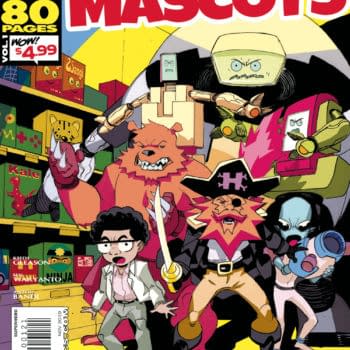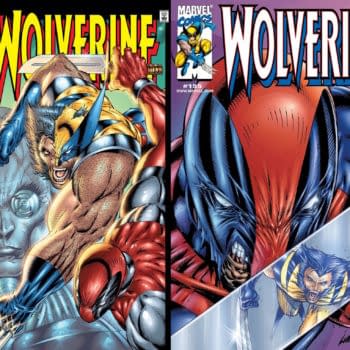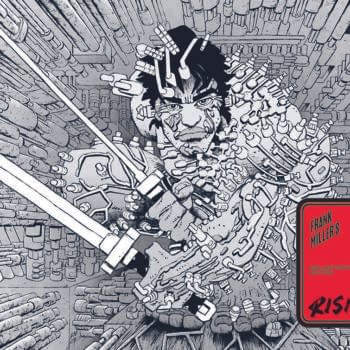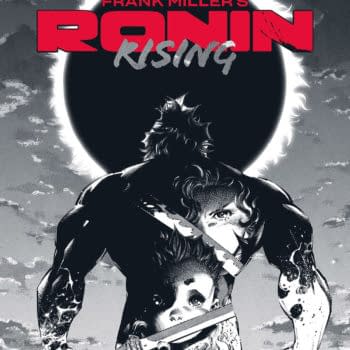Posted in: Comics, Review | Tagged: cyclops, uncanny x-men, x-men
Uncannily Fascistic – Uncanny X-Men #1

So much of the early history of the X-Men was rooted in politics. Professor Charles Xavier and Magneto were Martin Luthor King and Malcolm X with superpowers, and the political implications of both their dreams weighed heavily on the first 25 years of X-Men history. The defining moments for Magneto came not against the X-Men themselves but in his dealing with a Russian nuclear submarine in Uncanny X-Men #150 and his appearance before the Hague in Uncanny X-Men #200.
Yet, despite the strong political implications involving a persecuted minority, those stories faded into the background with the departure of Chris Claremont at the end of 1991. Deep discussions of morality and political implications get in the way of a good slugfest that crosses over between 12 titles, comes polybagged, and includes a special collectible card that you could care less about.
However, over the last few years, the political implications involved with Marvel's Not-So-Merry Mutants have crept back into the line, with them coming to the forefront with the debut of Utopia. Now, with the Schism over, we have one team fully aware of the politics behind their existence, both as a team and as a species, and that's the team featured in Uncanny X-Men, Volume II.
Right from the cover, one can pick up on the politics of this issue, with a cover that is very emblematic of communist propaganda. It is possible that Carlos Pacheco did not intend this, but he's too good, and has too much experience in the industry, for this to not have been intentional. How different are the poses and the feel of the cover of Uncanny X-Men, Vol. II, #1 to that of the ones in this poster of Chairman Mao?
The political overtones begin almost immediately in this book. We have Utopia closed off from the world by order of King Namor, yet the X-Men are free to travel throughout San Francisco, where they serve as a police force that answers to no one but themselves. Shortly thereafter, on Utopia, we have Cyclops, the mutant Mao, dubbing his core group of X-Men his "Extinction Team," the team he feels truly deserves the title of, "Earth's Mightiest Heroes," clearly perturbed that the Avengers seem to have that mantle. However, the name "Extinction Team" has nothing heroic associated with it, but it is filled with political overtones; rather than a simple branding of the team identity, this name is a strong statement to the rest of the world. This statement Cyclops would have us believe is about showing the world that they are the ones repeatedly saving them from extinction, but the reality is that this name will only be seen by baseline humans as a threat, that the team's name comes from their goal of extinction for the non-mutants. Further, in comparing Utopia to a rogue state like North Korea or Iraq until its previous regime, Cyclops is indeed welcoming that association.
I keep using Cyclops here rather than Scott Summers because in many ways Summers is dead. There is no longer a private life for Cyclops, only the 24-hour role he must play as leader for his people. Or rather, that he choses to play, for as much as Cyclops would want to pretend in the past that he begrudging took on the leadership role, there is no one saying that he must be the Chosen One, and clearly there are those mutants that reject this (see: Wolverine and the X-Men).
Joining Cyclops on the team is Magneto, a mutant that often saw himself as the Chosen One, the leader that would lead mutants to the Promised Land, but now sees himself more as a willing follower of someone falling in his footsteps. Magneto is the mutant Lenin, Cyclops Stalin.
While for me the politics was the fun part of the story, I can easily see how for others it would be a huge bore, and there was far more character development than actual action in this issue. That said, with it being the first issue, albeit one with characters that have been amongst the most popular for the last 30 years, there is a need to give everyone a sense of who the players are, where they fit, and why they are together, and writer Kieron Gillen does a very good job of that here. The dialogue feels very true to the characters that we have known for ages, although in Cyclops' case it is of the character pushed to extremes.
One does have to wonder how long this team can hold together with the amount of tension between the characters. Storm despises Magneto, yet still stands by his side, while there is also a rivalry between Magneto and Namor, and Namor is in a love triangle with Cyclops and Emma Frost. There is the tension too between Colossus and… well, Colossus, as he battles the inner demons left behind from Fear Itself, embracing the powers he gained while hopeful that he does not lose himself to those powers. Danger continues to have contempt for those of the flesh, as she states, after telling Dr. Nemesis, "Modulate your tone. I am not a microscope," that, "… if I am one, you're under it."

I find myself hating most of the characters in this book, yet I find the angle more than compelling enough that I will be coming back for more.















